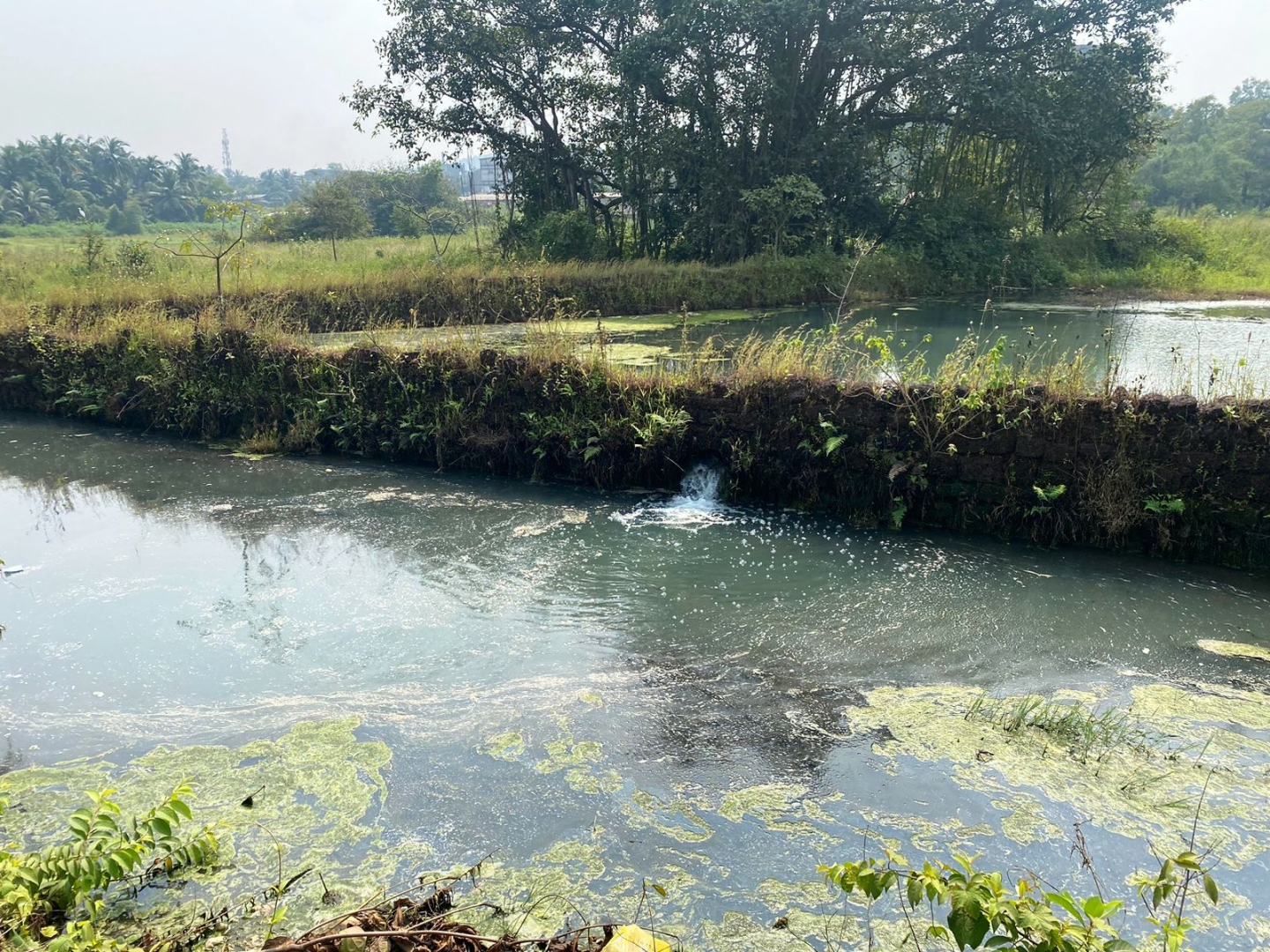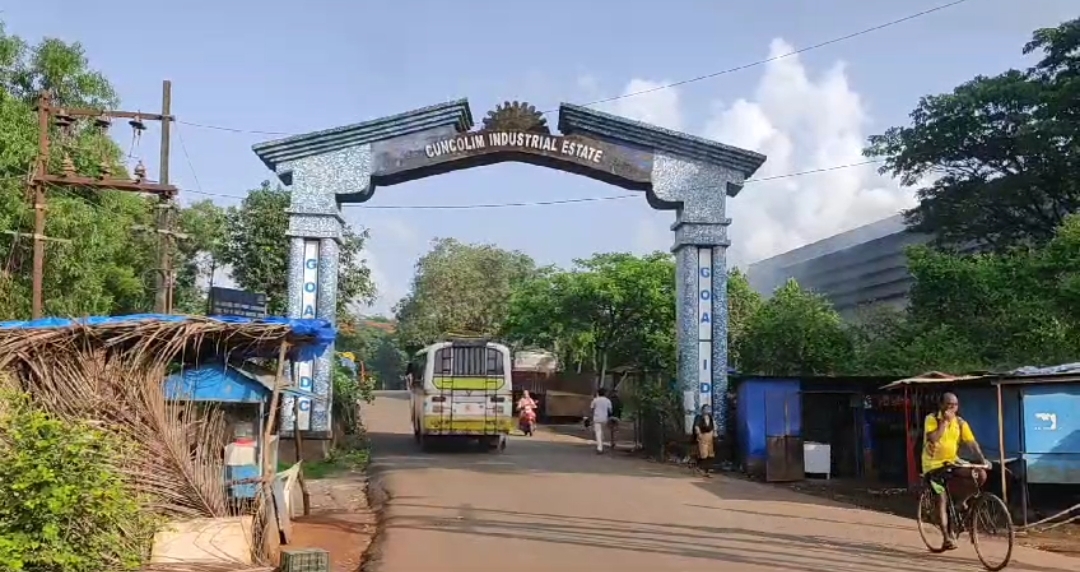Residents hail pollution control board denial of second fish meal unit, say battle not over

File photo of water discharged from the Cuncolim Industrial Estate into the adjoining water bodies.
MARGAO
The Goa State Pollution Control Board’s (GSPCB) recent decision to reject the application for consent to establish a second fish meal plant in the Cuncolim Industrial Estate may ring in good news for Cuncolkars, who have long been battling severe pollution in the area.
This move effectively halts, at least for now, plans to set up another fish meal plant in Cuncolim — a proposal that has faced stiff resistance from local residents and environmental activists.
Cuncolkars, who have been waging a persistent campaign against pollution caused by industrial units at the Cuncolim Industrial Estate, are now seeking answers from both the government and the GSPCB. Their primary concern: When will they receive permanent relief from the pollution caused by existing fish meal and fish processing units?
Residents and environmental groups have cited several reasons for opposing the new plant. Chief among them are allegations that the current fish meal plant and fish processing units are responsible for significant environmental degradation —particularly air pollution due to persistent foul odours and groundwater contamination through the improper disposal of industrial effluents.
These concerns raise pressing questions: When will Cuncolim be free from the burden of pollution and unbearable stench? Does the GSPCB have any plans to conduct a comprehensive audit of the existing fish processing units in the Cuncolim Industrial Estate? If such an audit is already underway, when will it be completed, and what actions will follow?
Cuncolkars await concrete steps and lasting solutions — not just to stop future threats, but to address the ongoing environmental crisis they continue to endure.
This is not the first time the people of Cuncolim have successfully opposed the establishment of a second fish meal plant, both inside and outside the Industrial Development Corporation (IDC) area. Their opposition stems from a decade-long struggle against the unbearable odour emitted by the existing facility, and the discharge of untreated effluents into nearby water bodies.
Despite the recent victory, residents say the fight is far from over. “It was indeed good to hear the news that the GSPCB has denied consent for the new fish meal plant proposed outside the Cuncolim IDC,” said one resident. “We hope the promoters see reason and respect the sentiments of Cuncolkars by withdrawing the project,” he said.
He added a note of caution: “The battle is far from over. Cuncolkars have been consistently fighting against the pollution caused by the fish meal and fish processing units, especially due to the rampant discharge of effluents. The GSPCB and other authorities must go to the root of the issue and resolve it once and for all. Units responsible for pollution must be shut down.”
Cuncolim council seeks GSPCB site inspection
MARGAO: The Cuncolim Municipal Council is looking forward for the Goa State Pollution Control Board (GSPCB) for a comprehensive site inspection of all existing pollution-causing industrial units in the Cuncolim Industrial Estate.
While rejecting the application for the second fish meal plant proposed outside the Cuncolim IDC, the Cuncolim civic body at its meeting held on September 9 last had resolved for a site inspection in order to ascertain compliance with environmental norms and to take appropriate action as deemed necessary.
Resolutions adopted by the Cuncolim civic body were communicated to the GSPCB immediately after the meeting held on September 9. In fact, Cuncolim Municipal Chairperson Landry Mascarenhas informed he will asked the Cuncolim Municipal Chief Officer to write to the GSPCB to find out whether the Pollution Control Board has initiated any action based on the Council resolution.
Resolution adopted by the CMC on September 9 last states as under: “It is further resolved that representation be sent to the Goa State Pollution Control Board (GSPCB) requesting them to conduct a comprehensive site inspection of all existing pollution-causing industrial units in the Cuncolim Industrial Estate and to take necessary regulatory action against any units found violating environmental norms, including fish meal plants.”
Resolutions adopted by CMC on Sept 9
Resolution no. 1:- “Be it resolved that based on the unanimous objections raised by all the councillors present and considering the public health and environmental safety concerns, the request of Goan Marine Impex Pvt Ltd seeking issuance of a No Objection Certificate (NOC) for the proposed Factory Building, Security Office Building, Store Shed, and Compound Wall at Survey No. 339/0 (Part) and 340/1 (Part) of Village Cuncolim is hereby rejected
It is further resolved to send back the approved plan to Town and Country Planning Department for clarification regarding approach road to the proposed Fish Meal Plant
Also resolved to request the Goa Investment Promotion and Facilitation Board (Goa-IPB) to revoke the in-principle approval granted to M/s Goan Marine Impex Private Limited
It is further resolved that representation be sent to the Goa State Pollution Control Board (GSPCB) requesting them to conduct a comprehensive site inspection of all existing pollution-causing industrial units in the Cuncolim Industrial Estate and to take necessary regulatory action against any units found violating environmental norms, including fish meal plants
Fate of ‘Polluter Pays’ notices to fish processing units questioned
